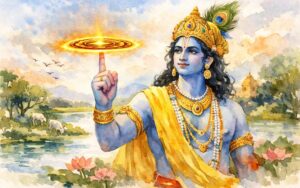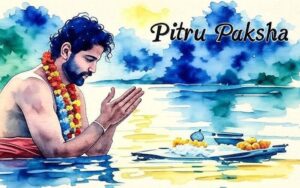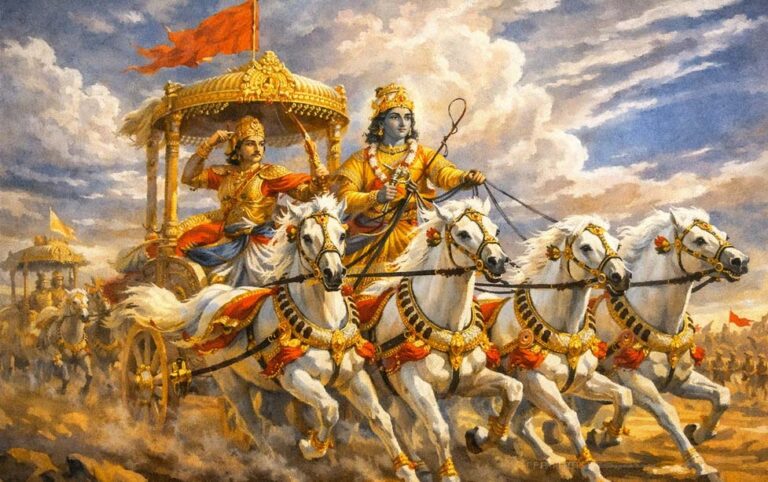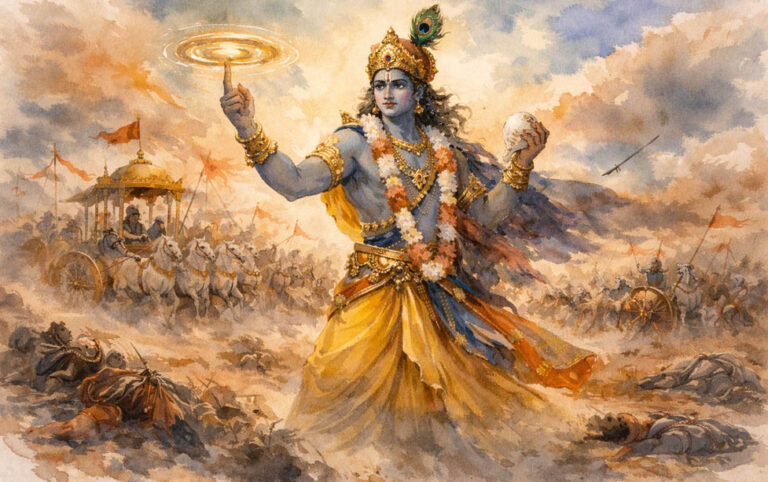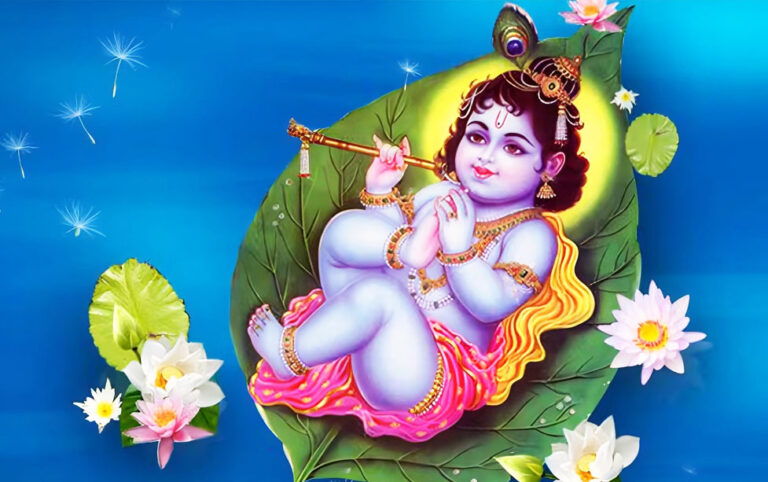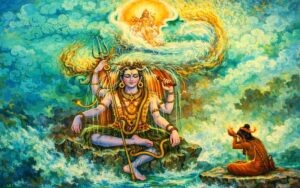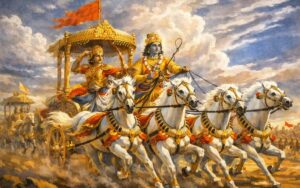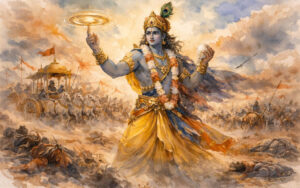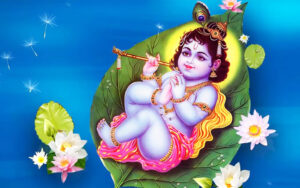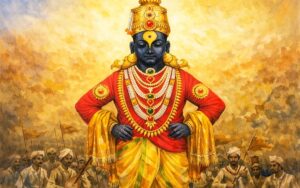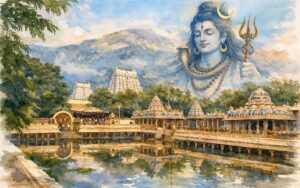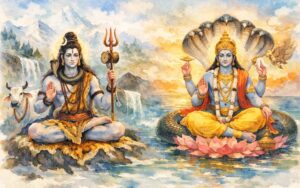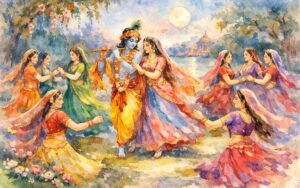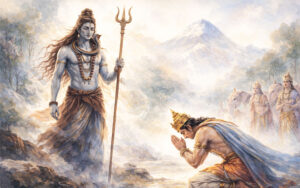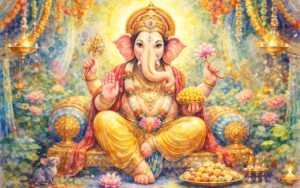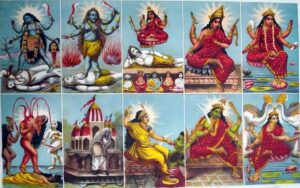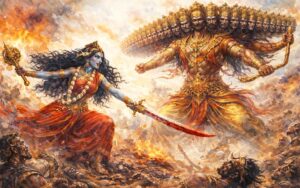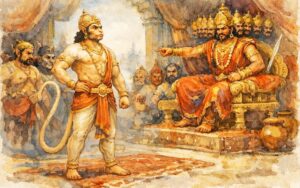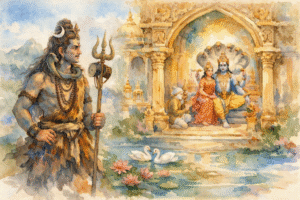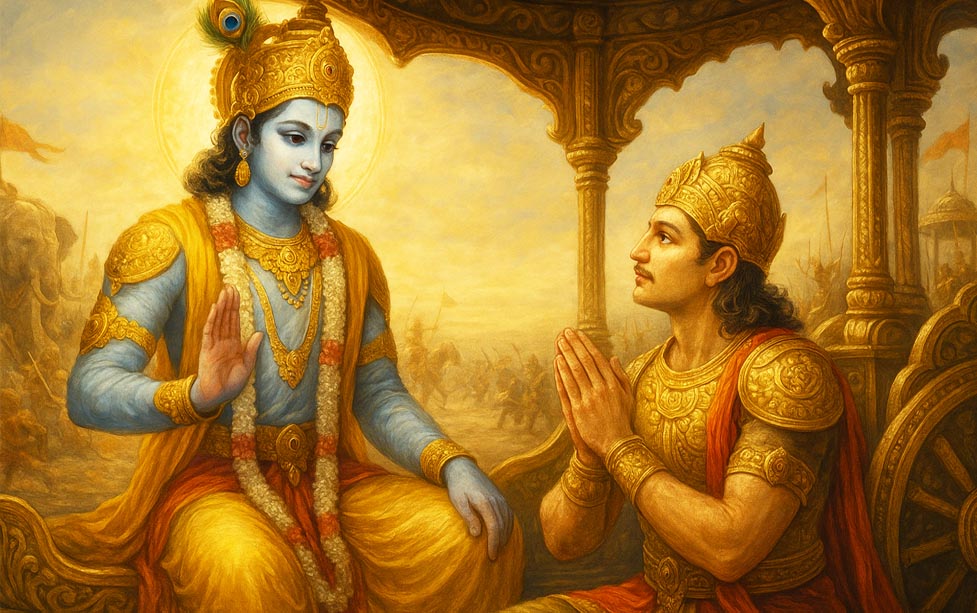
No time for reading the story? Give it a listen on Spotify.

Read how Shiva with Krishna's help granted Arjuna the Pashupatastra a second time to fulfill his vow against Jayadratha in the Mahabharata.
Characters in the story:
Lord Krishna: Lord Krishna is one of the most popular and revered deities in Hinduism. He is worshiped as the eighth avatar of Lord Vishnu and is known for his divine teachings in the Bhagavad Gita and for his role in the epic Mahabharata.
![]()
Arjuna: Arjuna is a skilled and virtuous warrior prince and one of the central characters in Mahabharata. He is renowned for his archery prowess and is a key figure in the Kurukshetra War, where he faces moral dilemmas on the battlefield, eventually receiving divine guidance from Lord Krishna.
The 13th day of the Kurukshetra war ended not with triumph, but with profound sorrow in the Pandava camp. The heroic Abhimanyu, Arjuna’s beloved son, had been tragically killed. Tricked into an ancient battle formation and brutally outnumbered, the young warrior met his end.
A grief-stricken Arjuna was consumed by anguish and guilt. His pain soon turned into a fiery, unshakable vow: he would kill the warrior Jayadratha, who had blocked the path to Abhimanyu, by sunset the next day. If he failed, he would commit suicide by fire.
The weight of this promise was immense. The entire Kaurava army, led by the invincible guru Drona, would protect Jayadratha. How could one warrior succeed against such odds?
A Divine Consolation in a Dream
Tormented and unable to sleep, Arjuna finally drifted into a restless slumber. In his dream, his charioteer and divine guide, Lord Krishna, appeared before him.
Krishna, understanding his friend’s despair, offered a solution. “Your vow can be fulfilled, Arjuna,” he said. “But you must recall the most powerful weapon in the universe—the Pashupatastra. Pray to the three-eyed Lord Shiva, who first blessed you with it.”
This raises a famous question: Did Arjuna forget the mantra? The epic suggests not a forgetfulness of mind, but a paralysis of spirit. His grief had clouded his divine connection. He needed to recollect not just the words, but the power and confidence that came with them.
The Mystical Flight to Mount Kailash
Guided by Krishna, Arjuna’s spirit embarked on an incredible journey. Krishna took his arm, and together they soared northward at the speed of thought. They flew over celestial mountains adorned with gems, passed the heavenly gardens of Kubera, and crossed the luminous Ganga river where great sages meditated.
Finally, they reached their destination: the magnificent, snow-capped peak of Mount Kailash. There, in all his awe-inspiring glory, sat Lord Shiva. The destroyer of worlds was surrounded by radiant beings, with his consort Goddess Parvati by his side.
The Rebirth of the Pashupatastra
Bowing before Shiva, Arjuna saw a miraculous sight: the very offerings he made to Krishna each night were now at Shiva’s feet—a sign of the divine unity between these two great powers.
When Arjuna prayed for the Pashupatastra, Shiva smiled and directed them to a nearby lake of nectar. There, they found the weapon not as a mantra, but in a terrifying physical form: a thousand-headed serpent breathing fire.
Through prayer and hymns praising Shiva, Krishna and Arjuna calmed the beast. It then transformed into a brilliant celestial bow and a single, terrifying arrow. A divine brahmachari (celestial student) emerged from Shiva himself to demonstrate how to wield the weapon. Arjuna watched, learned, and absorbed the knowledge once more.
Shiva blessed Arjuna, assuring him his vow would be successful.
Awakening with Renewed Strength
Arjuna awoke the next morning transformed. The dream felt more real than any waking experience. He recounted the entire vision to his brothers, his spirit now fortified with divine certainty.
This was not a story of forgetting, but one of reaffirmation. The journey to Kailash served a deeper purpose:
To heal a broken spirit: Shiva and Krishna acted as divine therapists, pulling Arjuna from the depths of his despair.
To restore confidence: The dramatic ritual was a powerful psychological boost, reminding Arjuna of his own immense capabilities and the divine forces supporting him.
To ensure destiny: The vow had to be fulfilled for the course of the war to continue. This dream was the key to making it happen.
The sage Vyasa later confirmed that from that day forward, a form of Shiva himself marched ahead of Arjuna’s chariot, clearing the path for his arrows.
The story of the second Pashupatastra is one of the Mahabharata’s most profound lessons. It teaches that even the greatest heroes can falter under grief, and that true strength often requires divine grace and friendship.
Krishna, the guide, knew that Arjuna needed more than a strategy; he needed a spiritual awakening. By taking his hand and leading him to Shiva in a dream, he helped his friend reclaim the power that had always been within him.
It was a journey of the soul that changed the fate of the war.


